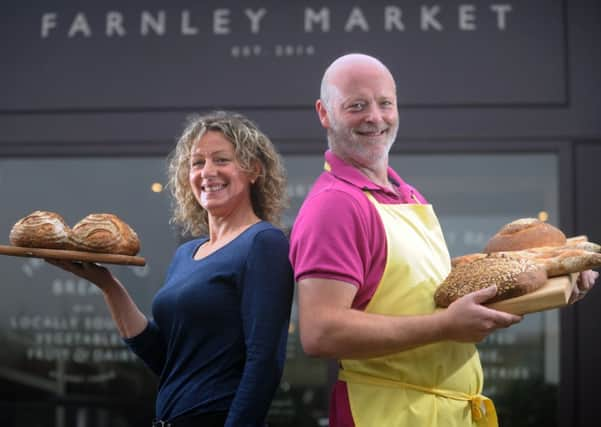Couple leading the rise of the artisan bakery


It was while queuing for a sandwich that Stephen Harrison had an epiphany which was to change his life.
“I saw a framed newspaper clipping on the wall which explained the difference between bread made in commercial bakeries and supermarkets compared with that made in small artisan bakeries situated around the country,” he explains.
Advertisement
Hide AdAdvertisement
Hide Ad“Moreover, this highlighted the fact that most commercial bread is packed so full of additives and other chemicals to make it perform in a high-speed production environment, that it can actually be harmful to health. What alarmed me most was the fact that none of these chemicals are required to be specified on the label because of their classification as ‘processing aids’. This single event sparked an interest that has gone from a hobby to a fully fledged business.”
A keen cook, Stephen decided to experiment with ‘proper’ bread-making at home using organic ingredients, wild yeasts and authentic recipes.
Now he has turned that love of ‘real’ bread in to a business which he aims to make the heart of the local community.
Bakehouse at Farnley Market is in the tiny village of Farnley Tyas; it opened its doors to the public on Saturday following a VIP launch on Friday.
Advertisement
Hide AdAdvertisement
Hide AdIt is a huge change for Stephen and his wife Simone, who runs the business with him.
Stephen was co-owner and operations director of Birkby’s Plastics, based in Liversedge, a plastic injection moulding company serving a wide range of sectors including automotive, electronics, and other high reliability industries.
After selling the business in 2008 he joined the world of mergers and acquisitions.
“I was really looking for a business to buy,” he explains. “I got close twice but they didn’t work out. Then I suddenly realised that I could start my own business using my skills as an artisan baker.”
Advertisement
Hide AdAdvertisement
Hide AdHe completed an advanced baking course at the Artisan School of Cookery at Wellbeck in Nottinghamshire while looking for a suitable premises and hastily drawing up a business plan.
“It had to be local,” says Stephen, who approached the owners of Farnley Estate who were looking to diversify some of their farmland.
They set about converting and old farm shed used for housing tractors into the pristine Bakehouse and cafe.
The whole process took just eight weeks.
The Bakehouse is the first of multiple ventures planned by the couple which will all champion artisan produce and sit under the umbrella brand of Farnley Market.
Advertisement
Hide AdAdvertisement
Hide Ad“The brand is very important to us,” explains Simone who has recently graduated as a mature student with a first class BA (Hons) in Managing Performance at the University of Leeds.
The aim is to eventually include a Smokehouse, where Stephen will cure his own meat and make salami and chorizo.
There is already a cafe within the Bakehouse where people can also buy fresh fruit and veg as well as baking and other essentials.
“We have lived in Farnley Tyas for ten years and there are no other shops for miles around,” says Stephen.
Advertisement
Hide AdAdvertisement
Hide Ad“We wanted to create something which could become the centre of the community. Where people can come and learn about bread making and other artisan crafts. I want to inspire people to be home bakers. We want to be a community hub.”
Listening to Stephen talking about bread making, it is hard not to be infected by his passion.
He talks like a father does of his children when he tells me that his sour dough loaves take between three and four days to make, and that he plans to use French flour for his baguettes and Italian for his focaccia.
“If you are going to do it then do it properly,” he says. “It is about being authentic. Yes, it costs more but it is worth it for what you are getting.”
The Harrisons want to change the way we shop.
Advertisement
Hide AdAdvertisement
Hide Ad“In France people buy their bread fresh everyday, not from a supermarket where it lasts for weeks. There is a reason it does that and that reason is because it is stuffed full of chemicals. Once you have tasted artisan bread, you will never want to eat supermarket bread again,” says Stephen.
“I think it is just the start of this whole part of a food revival. People want to know more about the food they eat, where it’s coming from and what’s in it.”
Stephen is also in talks with a local farmer about growing their own wheat, which will be turned into flour at a local mill and then made into bread at the Bakehouse.
“You can’t get much better than that,” he says.
These ethics are all well and good but how do you sustain a business out in the sticks which already employs two people as well as the Harrisons?
Advertisement
Hide AdAdvertisement
Hide Ad“I am not going to sell wholesale,” says Stephen, with feeling. “What I really want to do is supply local restaurants as well as the public.”
Because of the way the bread is made there are no ridiculous early mornings, synonymous with the bakery business.
“This is a slow process,” he says, “which means we come in at 7.30am.”
While Simon and Stephen will be working together, they both have very different responsibilities within the business. While Stephen is making the bread, Simone will be looking after the customers and organising events, to further develop the Farnley Market concept.
For more details visit www.farnleymarket.co.uk